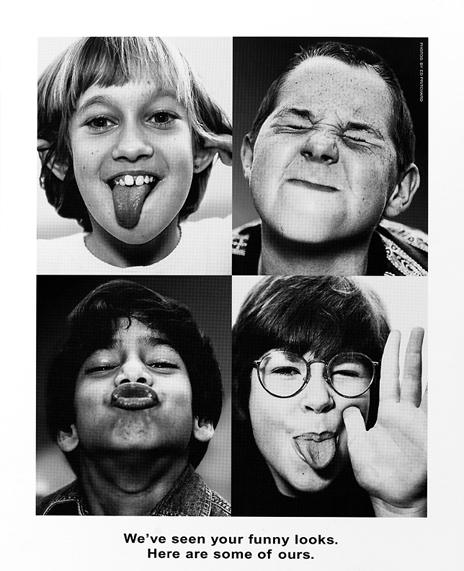Formerly known as the Spastics Society: The importance of charity names
- Published

Scope's 1994 poster announcing its name change
It's 20 years since The Spastics Society renamed itself Scope. Other disability charities have changed their names since. But in disability, what is a good name for a charity?
In 1994 Blur and Oasis were slogging it out for the Britpop crown, Don't Forget Your Toothbrush was the hot TV show, John Major was our prime minister and people with cerebral palsy were still referred to as spastics.
Valerie Lang was on the executive council of the Spastics Society at the time. She has cerebral palsy and had been passionate about a name change for years before it eventually happened. "I felt that we could not afford to stay with the name we had," she says. "The name spastic was a playground term of abuse. Children would shout to each other 'You big spastic' every time someone was clumsy or even if they just disagreed with them.
"Mothers with young babies who had cerebral palsy weren't seeking help from the society because they had heard the word used in playground parlance. I think it put the younger generation off."
Lang, now 74, says that people ceased to think of those with cerebral palsy as individuals. "We might have a brain injury in common but we are all different and don't want to be put in a box labelled 'spastic'."
The charity made the change at an extraordinary general meeting in March 1994. The chairman at that time, Anthony Hewson, noted the tension in the room and was worried some of the wheelchair users in the room might "wheel forward and lynch me" if the wrong decision was made.
"Scope" was one of several names considered. Others were reminiscent of the single-word abstract names popular with companies in the 1990s - Clipper, Clasp, Canopy, Patch, Ibex, Adepta, Tasq, Fulcrum, Cognosis, Capability. Other more traditional names under discussion included Action Cerebral Palsy and the Cerebral Palsy Society.
Perhaps sadly, one of the big factors in choosing Scope, a largely neutral name with no obvious link to disability or cerebral palsy, was that it could not be turned into a term of abuse.
Since that time, other disability charities have come onto the scene with positive names such as Enable or Ability. Arguably this approach has itself become somewhat cliched, and may eventually come back to haunt the charities because of their earnest positivity. It's terribly difficult to get it right when it comes to disability which - despite undoubtedly improving attitudes - is still an uneasy subject matter.
Perhaps the most notable and dramatic of recent charity name changes is that of the Royal National Institute of Deaf People (RNID), which is now Action on Hearing Loss.
Chief Executive Paul Breckell says it was a strategic decision. The name is a better reflection of the charity's work, he explains, as it doesn't only work with deaf people. He says many people weren't very aware of the charity with its four-letter brand: "The public confused us with similar names like RNIB, RNLI and RSPB.
"People don't always know what acronyms mean, they're clumsy and clunky and words like 'National Institute' have a tendency to date an organisation."
Mencap chooses to hold onto its name despite it being a splicing together of "mentally handicapped", a term now deemed inappropriate by many. Even the charity uses the phrase "learning disability" to describe the people it helps. (As a reminder of how far attitudes have changed, it's interesting to note that Mencap was actually called the Association of Parents of Backward Children when it was founded in 1946).
The charity defends its present name, and says that a change is not going to make any difference to the problems faced by people with learning disabilities. It points out that the name has, as it were, brand recognition and is widely recognised by the public and by politicians. Certainly, although the name may have its detractors, Mencap is a modern-thinking organisation which involves people with learning disabilities in its decision-making.
Though seen as a model for changing brand name, Scope has never rebuilt its brand awareness. Whereas 90% used to know what the Spastics Society was, only 64% answer "yes" when asked: "have you heard of Scope?" However, the charity says that although awareness may have declined, charitable income has not been affected.
Richard Hawkes, Scope's chief executive, says it was a real risk to drop one of the UK's best-known charity brand names, but it was important to make a strong statement that attitudes towards disabled people needed to change. "It was an important moment in our transition from being a traditional charity that helped vulnerable beneficiaries to being an organisation that's about working alongside disabled people to make change happen.
"Changing the name meant we could be side by side with all disabled people - who at that time were campaigning for important changes, like the introduction of the Disability Discrimination Act."
Follow @BBCOuch, external on Twitter and on Facebook, external, and listen to our monthly talk show